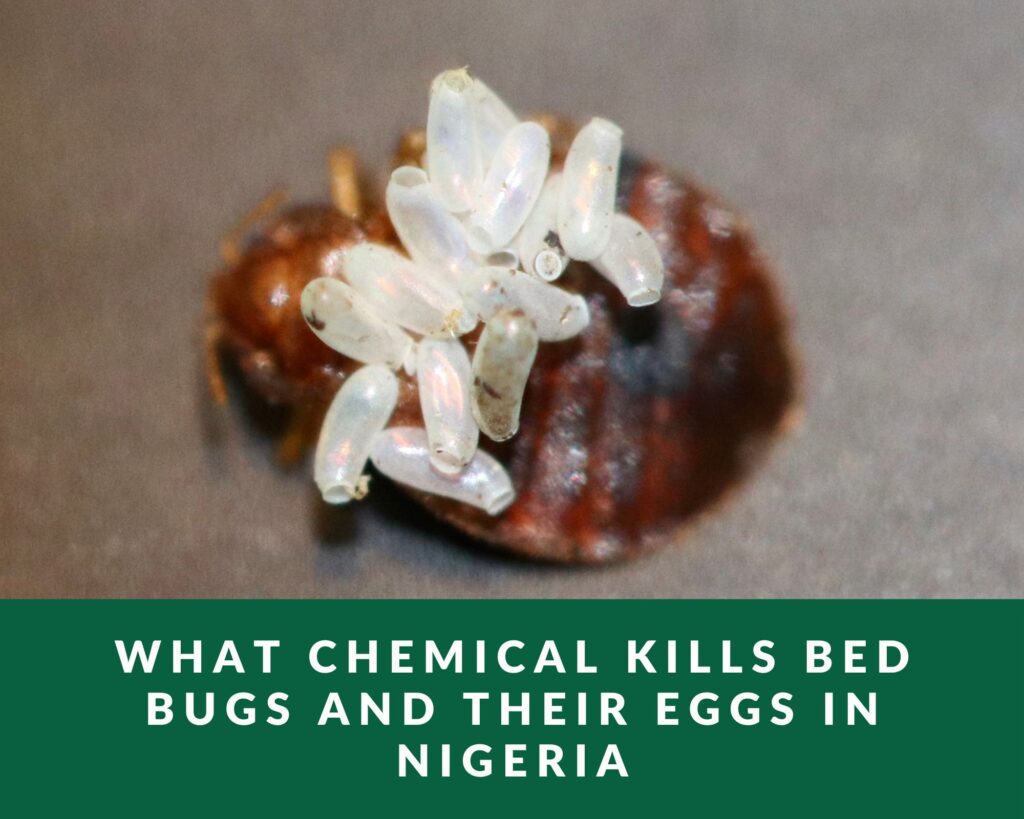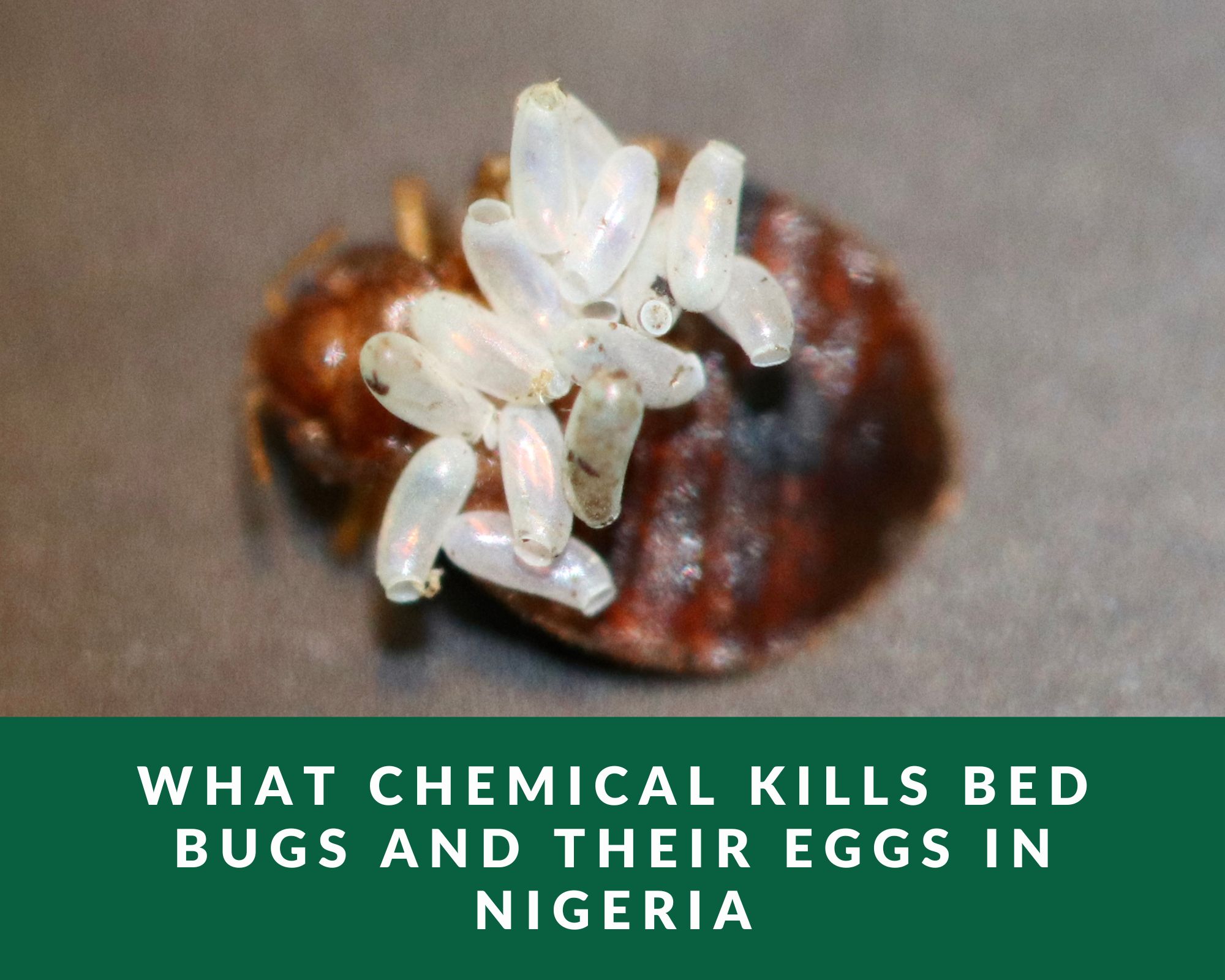What chemical kills bed bugs and their eggs in Nigeria
When bed bugs invade your house, you may be at a loss for how to get rid of them. Bed bug infestation can be such a nightmare. They are among the most difficult pests to eradicate because they reproduce swiftly and spread widely.

If bed bugs have infested your home, you undoubtedly want to get rid of them as quickly as possible.
You probably used the Internet to look up what chemical kills bed bugs and their eggs in Nigeria. You could feel overloaded and even bewildered due to the abundance of information available.
Read on to know how to get rid of bed bugs and their eggs permanently using chemicals.
How chemicals work on bed bugs
Chemical treatments are an essential component of any elimination approach. Irrespective of the fact that bed bugs’ sensitivity to pesticides has grown. The type of chemicals needed and their significance will vary depending on the infestation.
Bed bug infestations have evolved resistance to various products available in different states. Even how the treatment is applied (powders, liquids, aerosol sprays, etc.) could affect how effective it is.
What chemicals kill bed bugs and their eggs instantly
Over 300 pesticides have been recognized by the EPA as being safe to use against bed bugs. Good news, many of which can be used directly by customers in their own homes. In other words, if you are looking for how to get rid of bed bugs without an exterminator, here are remedies to get rid of bed bugs.
1. Pyrethrins/pyrethroids
The most widely utilized substances for eradicating bed bugs and other indoor pests are pyrethrins and pyrethroids.
Both substances are deadly to bed bugs and can kill them by forcing them out of their hiding places. They mess with their nerve function and cause paralysis — a tough but fair death sentence for any parasite.
See this: where bed bugs come from
Combining multiple products can increase their potential for success, but for tough populations, it may be necessary to switch to a different class of pesticide entirely.
2. Desiccants
Insects are killed by being dehydrated by desiccants, which are drying chemicals. They attack bed bugs by adhering to their sticky shells and ingesting the succulent fats and essential moisture contained therein.
Desiccants provide a number of advantages over all other insecticides, including the fact that the process is mechanical rather than chemical, making it hard for insects to evolve a resistance to it. Examples of desiccants include:
Diatomaceous earth
Diatomaceous earth causes insects to dry out and die by absorbing the oils and fats from the cuticle of the insect’s exoskeleton. Its sharp edges are abrasive, speeding up the process. It remains effective as long as it is kept dry and undisturbed.
Silica gel
Silica gels have tremendous oil-absorbing capability. Studies have shown that such highly “sorptive” dust is generally more effective than abrasive, less absorptive dust like diatomaceous earth, especially under field conditions.
3. Insect Growth Regulators
A unique kind of chemical called an insect growth regulator (IGR) is used to slow down or modify the growth of insects.
Bed bugs go through six stages on their approach to becoming adults, each more distressing than the last, which throws their life cycle out of balance and makes it impossible for the colony to sustain itself through breeding.
IGRs are used to progressively eradicate the entire population of bed bugs, as opposed to conventional insecticides that kill individual bed bugs. Long-term control measures like this are sometimes combined with chemical treatments that eradicate bed bugs and their eggs instantly.
Additionally, many IGRs are non-toxic and safe to use because they particularly target insect hormones.
4. Neonicotinoids
Bed bugs that are resistant to one chemical class may still be susceptible to another class. This is due to the different modes of action between these chemical classes.
Neonicotinoids are made of artificial nicotine and presumably have more effect on insects than it does on humans. They inflict damage on an insect’s neurological system.
The neurons of a bed bug are specifically made to continuously fire until they irreversibly die. Neonicotinoid exposure leads to paralysis and death.
5. Pyrroles
Chlorfenapyr is the sole pyrrole that can be used to treat bed bugs. Chlorfenapyr is a pro-insecticide because it needs another substance to be activated in order for it to be effective.
The chemical that results affects a number of bodily processes in the bed insect, ultimately leading to its demise. These are very slow acting, and they have limited efficacy but no issues of resistance.
6. Cold Pressed Neem Oil
Neem oil is made from the seeds of the tropical evergreen Neem tree. These trees are cultivated throughout Southeast Asia and Africa. Neem oil serves as a spray and acts as both an insecticide and a repellant. This causes bed bugs to simply avoid it rather than being killed by it.
On the contrary, this feature can be helpful for protecting you from bug bites while you sleep.
Keep in mind, neem oil loses its effectiveness after a week, well before it might completely eliminates an infestation. Yet again, it’s only one component of a comprehensive, well-balanced therapy plan.
What chemical kills bed bugs and their eggs in Nigeria?
Pestman’s Bed bug killer
Pestman’s Bed bug killer (powder) is highly effective in controlling bed bugs. Not only can it kill bug adults and nymphs but also their eggs fast on contact with assured efficacy. Usually, the bed bugs upon contact with the powder, lose their crawling capability.
Hot Shot Bed Bug Killer Spray
Hot Shot Bed Bug Killer Spray is a product that is designed to kill bed bugs and bed bug eggs indoors, as well as fleas and dust mites. The product contains a fast-acting formula that is designed to kill bed bugs and bed bug eggs on contact. It can be used on surfaces such as mattresses, bed frames, and box springs, as well as on carpets, upholstery, and other fabric surfaces.
What Next?
All of these chemicals may be useful in killing bed bugs, but they should all be used with extreme caution. Also, they shouldn’t be used by anyone who is not experienced in chemical pest control methods. It is advisable to seek the help of a pest control professional.
It can be difficult to find the correct chemicals. To pick the best product for your needs, be sure to read the labels. If that product is ineffective, you may be dealing with a population that is resistant. You will need to find an insecticide with a different or additional active component.

